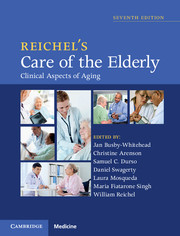Book contents
- Reichel’s Care of the Elderly
- Reichel’s Care of the Elderly
- Copyright page
- Contents
- Editorial Advisory Committee
- Contributors
- Acknowledgments
- Section I General approach to the care of the elderly
- Section II Geriatric syndromes
- Section III Care of the elderly by organ system
- Section IV Principles of care for the elderly
- Chapter 43 Surgical care of the elderly
- Chapter 44 Rehabilitation in the elderly
- Chapter 45 Geriatric sexuality
- Chapter 46 Aging in adults with intellectual disabilities and severe and persistent mental illness
- Chapter 47 Community-based long-term care for the elderly
- Chapter 48 Post-acute care and institutional long-term care for the elderly
- Chapter 49 Palliative and end-of-life care for the elderly
- Chapter 50 The mistreatment of older adults
- Chapter 51 Driving and the older adult
- Chapter 52 Integrative medicine in the care of the elderly
- Chapter 53 Implications of an aging society
- Chapter 54 Retirement
- Chapter 55 Cultural competence and health literacy
- Chapter 56 Caregiving
- Chapter 57 Performance improvement in a changing health-care system
- Chapter 58 Health-care organization and financing
- Chapter 59 Advance care planning
- Chapter 60 Ethical decision making in the care of the elderly
- Index
- Plate Section (PDF Only)
- References
Chapter 59 - Advance care planning
Using values and orders in end-of-life care
from Section IV - Principles of care for the elderly
Published online by Cambridge University Press: 05 June 2016
- Reichel’s Care of the Elderly
- Reichel’s Care of the Elderly
- Copyright page
- Contents
- Editorial Advisory Committee
- Contributors
- Acknowledgments
- Section I General approach to the care of the elderly
- Section II Geriatric syndromes
- Section III Care of the elderly by organ system
- Section IV Principles of care for the elderly
- Chapter 43 Surgical care of the elderly
- Chapter 44 Rehabilitation in the elderly
- Chapter 45 Geriatric sexuality
- Chapter 46 Aging in adults with intellectual disabilities and severe and persistent mental illness
- Chapter 47 Community-based long-term care for the elderly
- Chapter 48 Post-acute care and institutional long-term care for the elderly
- Chapter 49 Palliative and end-of-life care for the elderly
- Chapter 50 The mistreatment of older adults
- Chapter 51 Driving and the older adult
- Chapter 52 Integrative medicine in the care of the elderly
- Chapter 53 Implications of an aging society
- Chapter 54 Retirement
- Chapter 55 Cultural competence and health literacy
- Chapter 56 Caregiving
- Chapter 57 Performance improvement in a changing health-care system
- Chapter 58 Health-care organization and financing
- Chapter 59 Advance care planning
- Chapter 60 Ethical decision making in the care of the elderly
- Index
- Plate Section (PDF Only)
- References
Summary
- Type
- Chapter
- Information
- Reichel's Care of the ElderlyClinical Aspects of Aging, pp. 781 - 796Publisher: Cambridge University PressPrint publication year: 2016



